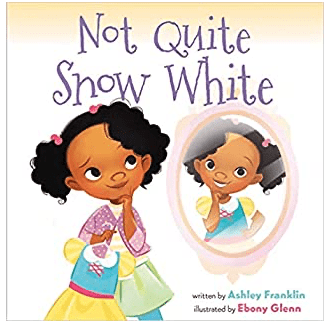Written by Ashley Franklin; illustrated by Ebony Glenn.
Meet Tameika, a sassy little Black girl who loves musicals! Not only does she have fabulous dance moves for every occasion, but a giant personality fit for stardom. She has her eyes set on the star role of her school musical, Snow White. As Tameika prepares for auditions, she is contested with body shaming and judged because of her skin color. The real Snow White isn’t brown, and as Tameika says, “There is no getting around being brown.”
Not Quite Snow White forces the audience to witness racism and body shaming. Ashley Franklin does a seamless job unifying your quick developed love for this striking character with the dejection she experiences due to biased comments. Words are powerful. What content we choose to speak has ramifications. Teaching social justice standards is imperative in the development of language and knowledge to accurately and respectfully describe how people are both similar to and different from each other. The intolerance in this book provides an any-age appropriate platform to speak about the unfair and biased lived experiences of others. The mistreatment of Tameika because of her diversity relates directly to teaching tolerance. Take this opportunity to encourage and teach one’s own ability to stand up to exclusion, prejudice, and injustice.
Tameika is a resilient girl with an incredibly supportive family; they teach an invaluable lesson, you are exactly who you were meant to be. Tameika’s mom reminds her, “You’ve got it all wrong! You are tall enough, chubby enough, and brown enough to be a perfect princess.” Do not corral your potential. Children deserve to know their own strengths, teach them that they are enough. Tameika’s perseverance conveys to the reader a sense of strength generated from self-affirmation.
I would recommend this book for anyone who is looking for children’s stories that address appearance and race and how those things impact young children. This book is appropriate for any age, but most relatable to ages 4-8. The text is easy to follow and full of heart. Discard other people’s judgements, instead focus on the fact that you are right for whatever you want to be.
I would address body image with the readers, as this book does introduce to the idea of body shaming and comparing. This may be empowering for some but new content for others. Be mindful as you approach this subject, young students do not need to be comparing themselves to one another.
